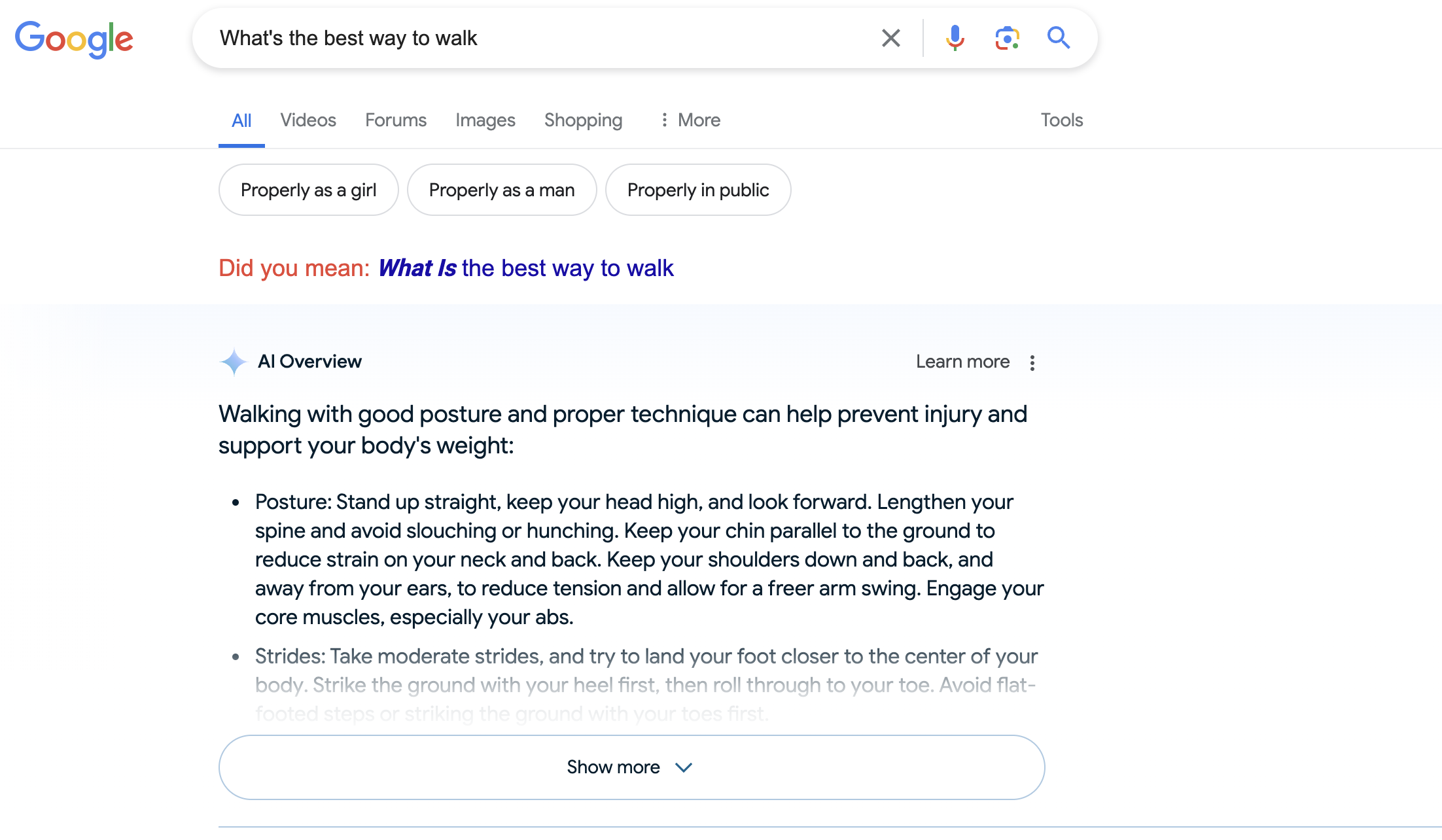Google is search. It has competitors, but they’re like barnacles on the base of a mighty ship, slicing through the internet. No one does search better and yet, Google insists on mucking up its stellar results with, naturally, artificial intelligence.
If you know me – and by now I assume you do – I’m no Luddite. I love new technology and am especially intrigued by AI, which I’ve been covering for almost 20 years. Granted the last two years have been almost nothing like the preceding 18, where AI was understood as a powerful and growing tech sector that could automate processes, manage simple tasks behind the scenes, and to a very limited degree power chatbot conversations.
Now, AI is like the Frank’s Red Hot Sauce tagline: “I put that sh*t on everything.” The algorithm and machine-learning-driven technology is everywhere, an inescapable fact of modern life and a potential disrupter to the established way of doing almost anything.
Normally, emerging tech might operate on the periphery of the mainstream, a space AI formerly occupied for much of its existence. Now, the landrush to be part of the AI revolution means that AI is applied at the center. If there’s something you do every day or perhaps are doing now (checking email, composing letters, making art) AI stands at the ready to assist. Unlike traditional tools, though, AI might not wait for you to ask. “Suggestion” is kind of AI’s default mode. Sometimes they’re great, sometimes they’re wrong. This is why I tend to prefer my AI standing on the sidelines, waiting to be called, and definitely not – as Google has chosen to implement Gemini in its search results – in an “AI Overview.”
“Google is the first place I go when I want to find something on the web or figure out virtually anything. I not only type search terms into Google, I regularly ask it questions—and it nearly always has the answers.” That is what I wrote 21 years ago about the then-still relatively new search engine.
Note the last bit. I was writing natural-language queries into Google’s search box long before AI was a glimmer in anyone’s eye. Google’s search algorithm was so good that in 2003 it already understood your search intention. Since then, I’ve never really thought much about what I type into that box. Spelling mistakes? Never mattered. Missing a word? Not a problem. Google just figures it out.
The Google Search box is not a place for careful rumination. Usually, I type in a rough, haphazard query, and if the results are overly broad or, in the rare case, it gets it wrong (never happens, TBH), I refine the original query.
Already the best
Google was always good enough at search and, for a long time, miles ahead of the competition. In recent years, Microsoft Bing, which takes a more subtle approach to AI integration, by the way), has closed a lot of the gap – though I still think Google is better. Or I did.
Now, we have AI Overviews. Powered by Google Gemini, AI Overviews take the vast number of results you’d receive for any query and boil them down into a more digestible summary. Google still considers AI overviews an experimental feature, which is why you don’t always see them. 95% of my search results do not include them. I wonder if we all see fewer of them because the initial results were often wrong or bizarre.
The wrongness is one problem, but it’s not my issue. My concern is about why we need AI Overviews at all. It occurs to me that highlighting AI on a search result in this way is a fundamental misunderstanding of the purpose of online search – and it’s coming from the King of Search.
AI Overview reminds me of a smart kid in class constantly raising their hand to show you how smart they are. I don’t blame them for being smart, but you can achieve the same result by acing your tests and not making everyone else feel like idiots (this is a lesson I did not learn soon enough in grade school).
AI Overview is Google showing off. Yes, its AI is smart and powerful, but AI’s purpose is not to be a showpiece or some kind of search and summarization magic trick. Google should be using AI to enhance the quality of its results without remaking them to showcase AI.
What I see is a giant search company so concerned about competition from Microsoft and Copilot that it felt the need to put AI Overviews results above its best product: search results. And you know what that does, right? It pushes search results further down the page, and depending on the screen (desktop or mobile), you might not even see the traditional results.
Get out of my way

The other day, my adult son was on his phone searching and started cursing at his phone: “No, I don’t want an AI overview. Get this thing out of the way.” Of course, he cast a glance in my direction as if I had something to do with it. My family often blames me for all tech foibles because I’m “in the industry”.
In this case, I agree with my son. There is simply no need to show AI Overviews when the current results are so good and accurate. I’m not even getting into the issue of how pushing down these results is going to hurt (or kill) the content creators who’ve supported the search engine for a generation. Your search engine is nothing without our information…but that’s a different post.
What concerns me is that Google seems unaware that its efforts to keep up with the competition could hurt its most valuable product. People want search results and nothing else. Give them that, and they’ll be Google search customers forever. Force them to scroll through AI Overviews, and you will lose them to the competition.
The answer is simple, Google can remain the leader if it takes the Gemni AI smarts and uses them to improve search results but without showing anyone how it’s doing so. If Gemini is only allowed to trade in facts, this could make Google Search even more effective, and that’s a win for Google and a win for its fans who just want to Google.





